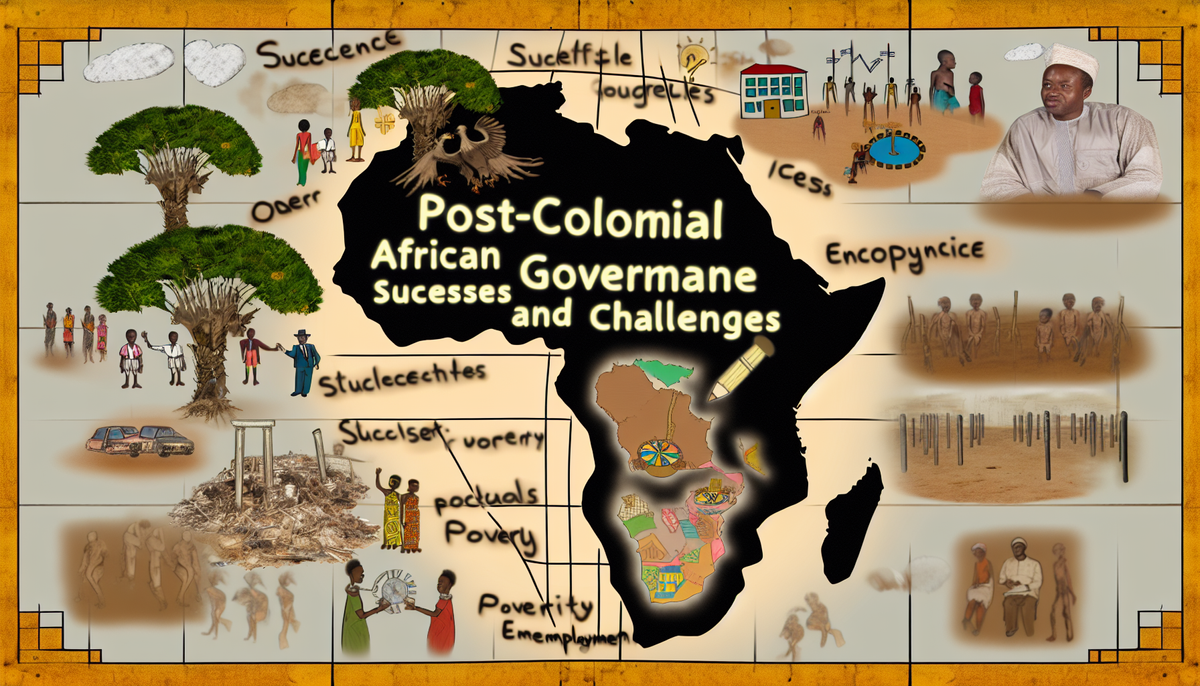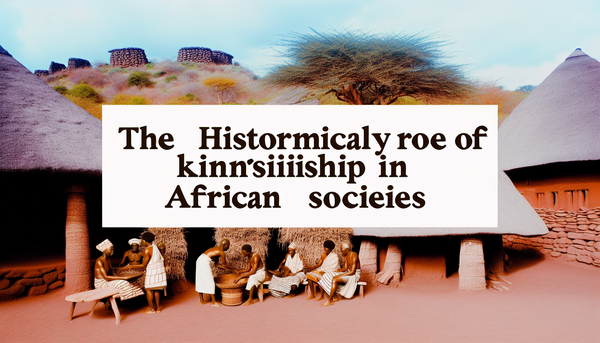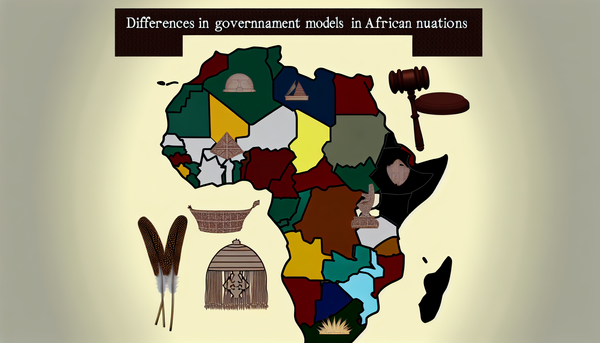Post-Colonial African Governance: Successes and Challenges

Introduction to African Post-Colonial Governance
African post-colonial governance refers to the leadership and management practices that emerged in the continent following the end of colonial rule. The transition from colonialism to independence marked a significant turning point in African history, as countries sought to establish their own political systems and structures. African nations inherited varying degrees of political, social, and economic challenges from their colonial past, shaping the governance landscape in diverse ways.
The post-colonial period has been characterized by efforts to build stable and effective governance systems that are reflective of the African context and address the needs of the population. This era has seen a mix of successes and challenges as countries navigate issues such as democratization, economic development, social inclusion, and cultural diversity.
Understanding African post-colonial governance requires a nuanced exploration of historical legacies, contemporary realities, and future aspirations. By analyzing the achievements and setbacks in governance practices, we can gain insights into the complexities of nation-building and development in the African context.
Historical Context and the Transition from Colonial Rule
The transition from colonial rule to post-independence governance in Africa was shaped by a complex interplay of historical, political, and social factors. European colonial powers established control over African territories through conquest and exploitation, imposing their governance structures and systems on the indigenous populations. This era left a legacy of political fragmentation, social inequality, and economic dependence that influenced the post-colonial landscape.
The struggle for independence in Africa was marked by movements for self-determination and liberation from colonial oppression. The decolonization process, which unfolded over several decades, resulted in the emergence of newly independent nations seeking to define their own identities and governance frameworks. The transition from colonial rule presented both opportunities and challenges as African countries grappled with the task of rebuilding their societies and redefining their political systems.
Examining the historical context of African post-colonial governance provides valuable insights into the enduring impact of colonialism on contemporary African states and the complexities of nation-building in the aftermath of foreign domination.
Analyzing Political Stability and Governmental Structures
Political stability and governmental structures are essential components of effective governance in post-colonial Africa. The stability of a country's political system is crucial for ensuring peace, security, and sustainable development. Many African nations have struggled with issues of political instability, including coups, civil unrest, and governance crises, which have hindered their progress.
Governmental structures play a key role in shaping the distribution of power, resources, and decision-making processes within a society. The design of these structures, including the separation of powers, checks and balances, and mechanisms for accountability, can significantly impact the effectiveness and legitimacy of governance. In many African countries, efforts have been made to reform and strengthen governmental structures to promote transparency, inclusivity, and responsiveness to citizens' needs.
Analyzing the interplay between political stability and governmental structures provides valuable insights into the challenges and opportunities facing post-colonial African governance. By examining the effectiveness of existing systems and identifying areas for improvement, African countries can work towards building more resilient and adaptive governance frameworks that are better equipped to address the diverse needs of their populations.
Economic Development and Post-Independence Progress
Economic development has been a central focus of post-independence progress in Africa, as countries seek to overcome the legacies of colonial exploitation and achieve sustainable growth and prosperity. The transition from colonial rule presented both opportunities and challenges for economic development, with many African nations inheriting unequal and underdeveloped economic structures.
Efforts to promote economic growth and development have involved diversifying industries, expanding infrastructure, fostering investment, and improving access to education and healthcare. Despite significant progress in certain areas, many African countries continue to face obstacles such as poverty, inequality, corruption, and external debt, which hinder their economic advancement.
The pursuit of economic development in post-colonial Africa is closely intertwined with broader governance issues, including political stability, governmental effectiveness, and social cohesion. By addressing these challenges and implementing sound economic policies, African nations can work towards building resilient and inclusive economies that benefit all segments of society.
Understanding the complexities of economic development in post-independence Africa requires a multi-dimensional analysis that considers historical contexts, contemporary realities, and future aspirations for sustainable growth and development.
Socio-Cultural Impact and Policy Reforms
The socio-cultural impact of post-colonial governance in Africa has played a crucial role in shaping policy reforms and development strategies in the region. Cultural diversity, traditional practices, and community norms have influenced governance structures, decision-making processes, and social dynamics in African societies.
Policy reforms aimed at addressing socio-cultural challenges have focused on issues such as gender equality, ethnic diversity, indigenous rights, and social inclusion. These reforms seek to incorporate diverse perspectives, empower marginalized groups, and promote social cohesion and harmony within the population.
By recognizing the importance of socio-cultural factors in governance and policy-making, African countries have the opportunity to develop more inclusive and responsive systems that reflect the values and aspirations of their diverse populations. Embracing cultural diversity and leveraging traditional knowledge can enhance the effectiveness of policies and programs, fostering greater trust and engagement among citizens.
The intersection of socio-cultural dynamics with policy reforms in post-colonial Africa highlights the need for holistic and context-specific approaches to governance that take into account the rich tapestry of identities, beliefs, and practices that shape African societies.
Case Studies of Successful Post-Colonial Governance Models
Several African countries have demonstrated successful post-colonial governance models that have contributed to stability, development, and progress in their respective nations. One notable example is Botswana, known for its strong democratic institutions, effective anti-corruption measures, and consistent economic growth. Botswana’s governance model emphasizes accountability, transparency, and inclusive decision-making processes, which have helped foster political stability and sustainable development.
Another success story is Rwanda, which has made remarkable strides in reconciliation, social cohesion, and economic growth following the devastating genocide in 1994. Rwanda’s governance model prioritizes unity, justice, and innovation, leading to significant improvements in healthcare, education, and infrastructure.
Ghana is also recognized for its democratic governance, peaceful transitions of power, and commitment to human rights. The country’s efforts to promote good governance, rule of law, and economic diversification have positioned it as a model for successful post-colonial governance in Africa.
These case studies highlight the diversity of approaches and strategies that African countries have employed to navigate the challenges of post-colonial governance and achieve positive outcomes for their citizens. By examining these success stories, other nations can draw inspiration and learn valuable lessons for strengthening their own governance systems.
Ongoing Challenges and the Path Forward
While there have been successes in post-colonial governance in Africa, the region continues to face numerous challenges that hinder long-term stability and development. Persistent issues such as corruption, political unrest, ethnic tensions, poverty, and weak institutions pose significant obstacles to effective governance and socioeconomic progress.
Addressing these challenges requires a comprehensive and sustained effort to reform governance structures, enhance transparency, strengthen the rule of law, and promote inclusive policies that benefit all segments of society. Investing in education, healthcare, infrastructure, and economic diversification is essential for creating opportunities and reducing inequalities across Africa.
Furthermore, promoting regional cooperation, fostering peacebuilding initiatives, and engaging with civil society are crucial steps towards addressing root causes of conflict and promoting sustainable development. Collaboration with international partners, promoting good governance practices, and upholding human rights are also vital for overcoming ongoing challenges in post-colonial Africa.
The path forward for African countries lies in building on past successes, learning from failures, and embracing innovative solutions that empower citizens, promote social cohesion, and ensure equitable and sustainable development for future generations. By tackling ongoing challenges with determination and collective action, Africa can chart a path towards a brighter and more prosperous future.



